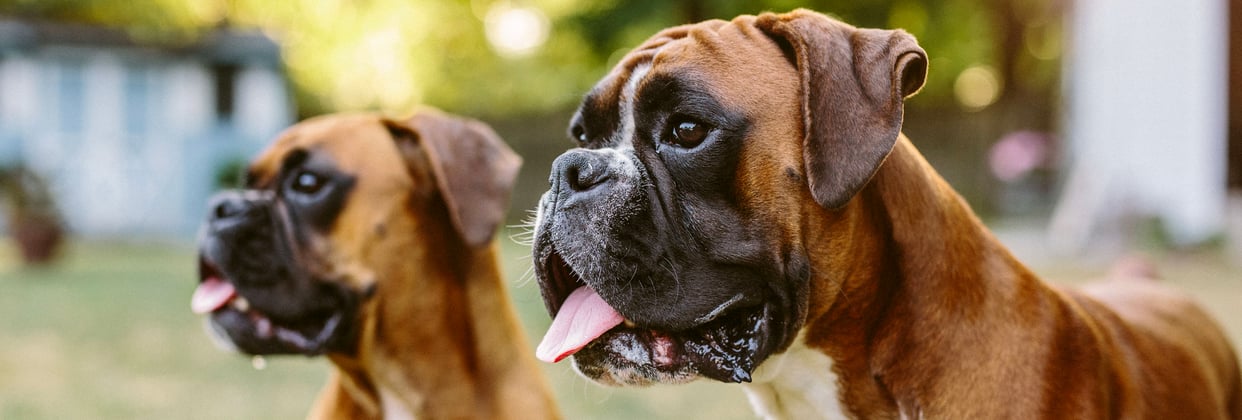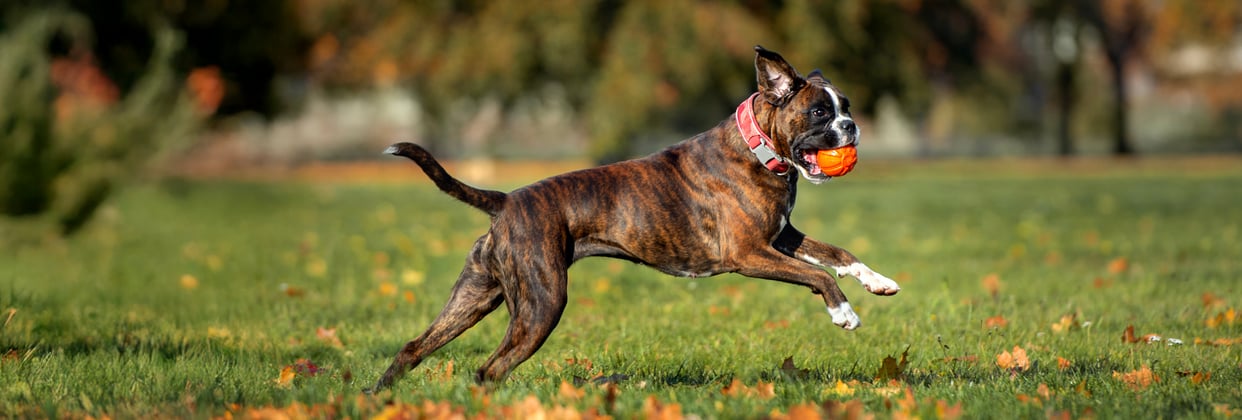The guide to owning a Boxer.
Want to know everything there is to know about finding the right dog for you? Submit your email below, and we’ll send you a one-stop guide to help you on your pet-ownership journey.
Jump to:
Stats at a glance.
A history of Boxers.
Meet the Boxer, a charismatic and energetic breed with origins tracing back to the late 19th century in Germany.
Ancestors of the Boxer dog include the Bullenbeisser, a now-extinct hunting dog once used to track formidable game like boar.
Over time, breeders refined the Boxer's features and temperament, producing the sociable pup we know today.
During World War I, agile Boxers served as messenger dog couriers, carrying vital notes across trenches. They’ve since evolved into a family dog beloved for their playful spirit, attentive nature, and unmistakable face wrinkles.
If you’d like to compare them to other larger canines, our guide to big dog breeds in the UK can help you see where the Boxer stands among fellow strong breeds.


How much is a Boxer puppy (UK)?
When buying a Boxer puppy in the UK, costs typically float between £1,000 and £2,500, depending on breeder reputation, location, and ancestry.
Some responsible breeders charge more if they invest heavily in breed health tests.
What to look for in a reputable breeder
A genuine Boxer-lover focuses on breed welfare long before profits.
Look for breeders who:
Invite you to meet the mum (and possibly the dad).
Provide breed standard paperwork or proof of pedigree dog lineage.
Share Boxer dog breed information about known conditions like Boxer cardiomyopathy or aortic stenosis.
Encourage you to ask questions about Boxer needs—exercise requirements, behaviour, training, and potential risk of developing certain ailments.
Are happy to show you vet records.
Colours and coat types.
Boxers are known for their bold, athletic look and their coats are just as eye-catching. Most Boxers come in fawn or brindle, often with white markings on their chest, face, or paws.
The full white Boxer actually appears more frequently than you might imagine. Around 1 in 4 Boxers are partially or fully white.
You might also see a variation called reverse brindle, where the dark stripes are so heavy they almost look black. (Fun fact: Boxers don’t actually carry the gene for a true solid black coat—so if you see one, it’s likely a very dark brindle!)
Their coat is short, sleek, and lies flat against the body. It sheds moderately throughout the year but needs minimal upkeep. A quick brush once a week is usually enough to keep them looking sharp.





Size and weight.
Boxers rank among the strongest dogs in the medium-large category. They stand 53–63cm at the shoulder, with males typically on the higher side.
Weight usually hovers between 25–35 kg, making them robust yet agile. That muscular physique, with prominent hind legs, hints at their guard dog potential and readiness for dog sports.


Temperament and behaviour.
Temperament
Boxers are friendly dogs, often known as the clowns of the canine world. They’re famous for having boundless energy, cheerful greetings, and a big attitude that fills the room.
Their playful hearts and desire for interaction mean they integrate well as a family dog. Yet, they also have a protective streak, which can help households seeking a dependable companion.
Do Boxers make good pets?
Absolutely. If you love an energetic breed that thrives on daily play, a Boxer could be a brilliant match.
They relish games, love people, and typically get along well with dogs and children, though supervision is key for safe interactions.
Are Boxers good with kids?
Yes. Most Boxers adore children, especially if socialised from puppyhood. Their boisterous nature means smaller kids might get accidentally knocked over in excitement. Consistent boundaries will help everyone remain safe and happy.
Are Boxers good with cats?
It depends. Some Boxers can have a prey drive, so slow, cautious introductions work best. If you have a resident cat, ensure the meeting is calm and positive. Patience often paves the way for a peaceful co-existence.


Do Boxers suffer from separation anxiety?
Many Boxers form strong bonds with their owners, so it’s not uncommon for them to feel anxious when left alone.
If you need tips on building independence, try reading up on Separation Anxiety, which also covers building a reliable routine.
Can Boxers be left alone?
They can for short windows (4 to 6 hours is often quoted) but every dog is an individual. If your Boxer becomes restless, consider a dog walker, doggy day care, or a friendly neighbour for midday visits.
Can Boxers live in apartments?
Yes, but they’ll need a dedicated exercise plan. A bored Boxer in a small space can get restless. A daily walk or yard play ensures they burn off steam. A well-managed routine can make them happy city dwellers.
Training a Boxer.
Are Boxers smart?
They are bright but sometimes stubborn. Early training with reward-based methods keeps them engaged. Boxers respond best to consistent, upbeat sessions so harsh corrections often backfire. They can excel in advanced tasks which is why they are sometimes used as search and rescue dogs or therapy dogs if properly guided.


Shedding and grooming.
Boxers have a smooth coat that’s short and require very little grooming.
They do shed moderately, mainly in spring and autumn. A weekly soft-bristle brush or grooming mitt easily lifts loose hair and distributes their natural oils.
How often should I brush my Boxer?
As mentioned above, once a week typically suffices. More frequent brushing during peak shedding seasons like early spring can help minimise fur tumbleweeds around your home. Occasional baths using mild shampoo keep their coat fresh.


Exercise and mental stimulation.
Boxers love movement. A brisk walk or game of fetch suits their playful side. Aim for around 60 minutes of daily activity.
They have a shorter muzzle and are sometimes considered a brachycephalic dog breed, so they may pant sooner in hot conditions, so watch for overheating.
Puzzle toys, obstacle courses, or even simple hide-and-seek can keep their minds busy.


Feeding and nutrition.
Feeding a Boxer dog breed well is vital to long-term health. Feed your Boxer high-quality dog food that matches their life stage, whether you have a puppy, adult Boxer, or senior. Boxers are prone to bloat, so dividing meals into two or three portions daily can help.
Always provide fresh water, especially if your Boxer gets hot or works up a thirst from active play.
Common health concerns.
Like any pedigree, Boxers have some unique concerns:
Charges vary widely by location and veterinary practice, but these figures give an idea of potential vet bills.


Pet insurance for Boxers.
Given their physical build and brachycephalic breeds' tendency toward breathing difficulties, insuring your Boxer can be a lifesaver.
At Waggel, we’ve built policies that help you handle everything from minor check-ups to major operations. Compare your options before the unexpected arises.
For dedicated coverage information, check out our Boxer Pet Insurance page. You’ll enjoy:
Lifetime cover for chronic conditions.
24/7 online advice from vet professionals.
Behaviour consultations to tackle training hiccups.
Simple claims with no messy forms.
The Boxer breed is a popular breed for a reason: loving temperament, spirited energy, and a face that melts hearts.
Whether you’re owning a Boxer for the first time or simply want to get to know the Boxer deeper, consistent guidance and mindful care will keep your canine buddy happy for years to come.
They might look tough, but they’re affectionate goofballs who’ll greet you with a wiggling tail every day. Enjoy life with your loyal, bouncy friend!


